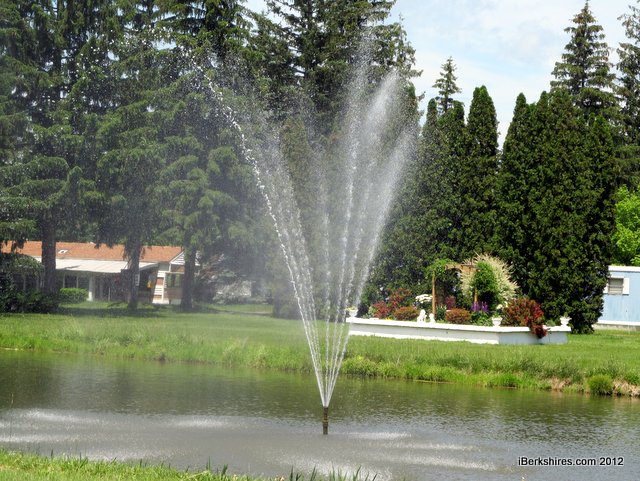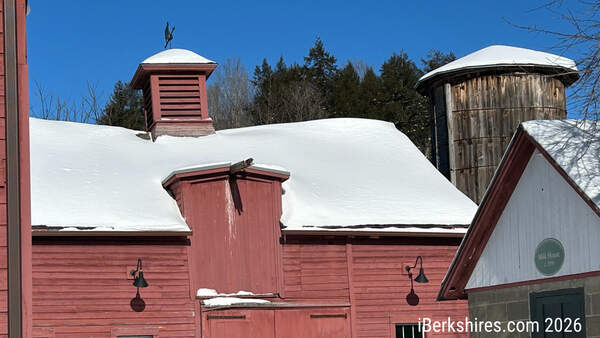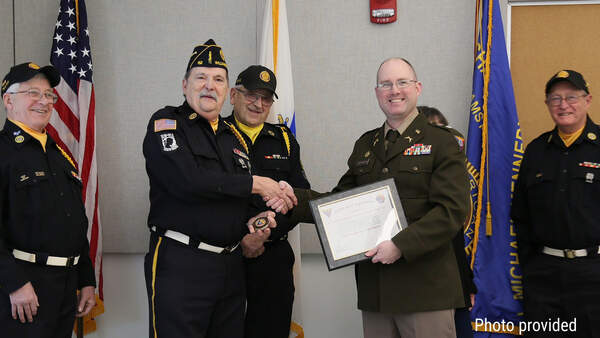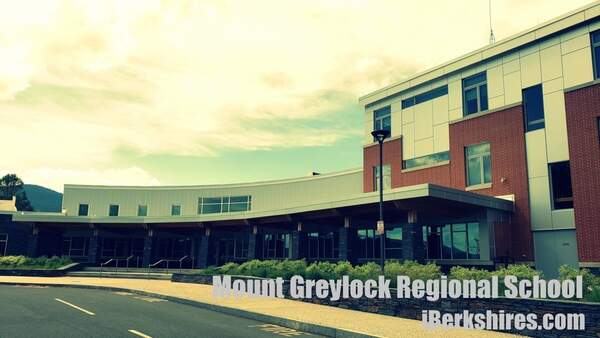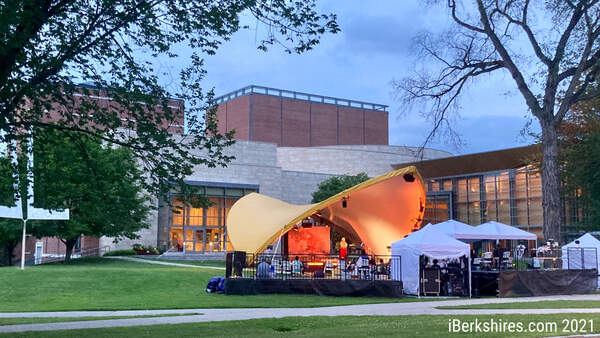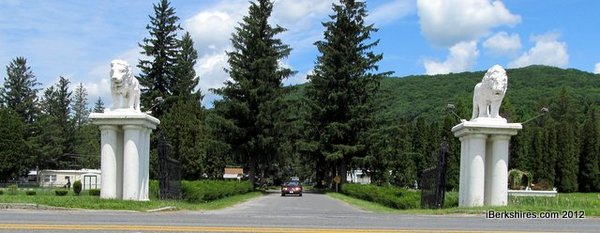
Founder Envisioned Spruces Park as Thriving Community
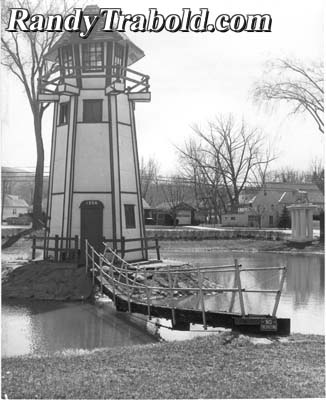 Al Bachand believed in making the park attractive, including building a lighthouse in the trout-stocked pond and installing a fountain. The current water feature doesn't have as fabulous a display. |
It's a far cry from its glory days of the 1950s.
Carl Westerdahl, president of the Williamstown Historical Museum, delivered a lecture recently at the David and Joyce Milne Library about the Spruces' earliest years under the leadership of its founder, Albert Bachand. His presentation, sponsored by the museum, gave the 75 attendees a glimpse into the late businessman's background.
Bachand, a colorful and prolific entrepreneur who died in 2003, claimed he founded more than 30 businesses, from selling government surplus and producing concrete-draining pipes to making grandfather's clocks and designing and selling construction office trailers.
"Al's life with trailers began in 1950, when he formed Berkshire Hills Mobile Home Sales and also formed Contractors' Trailer Co.," Westerdahl said. "It was his first big money-maker."
Yet it was the then new-fangled mobile homes that captured Bachand's imagination. He could sell them and create a place so attractive that he could convince those who bought the units to remain in there.
Bachand opened The Spruces on June 19, 1954, fulfilling his dream of introducing a new wonderful way of living, especially for older people.
A sign above the entrance held the promise that The Spruces was more than just a place to park a mobile home: "Be ye of kind heart, gentle mind, and neighborly spirit, then, through these portals pass, friends, for thou art welcome."
Bachand constructed many of the elements that would lead to The Spruces receiving the coveted five-star rating — the highest in New England and one of the highest in the industry.
In 1958, he bought an old, junked transit mix cement truck for $500 and reconditioned it to pour The Spruces' concrete streets, foundations, patios, walks, driveways, fountains, pool and more.
Ever trying to make living at the Spruces more pleasant, Bachand purchased several two-passenger bicycles and an aluminum row boat for residents to use on the Lighthouse Pond, which was stocked with hundreds of 8- to 14-inch trout.
He built a recreation hall, where residents gathered to attend parties, drink coffee together or play shuffleboard. The Whispering Fountains that he built in 1960 produced stunning displays.
"A 100 horse-power, diesel-engine pump shot water into the air at the rate of 1,000 gallons per minute at 140 psi through 1,500 jets. There also were 220 underwater colored lights and music, controlled from a panel of 100 switches located in a boat," Westerdahl said.
The fountains were eventually dismantled because of traffic tie-ups as drivers stopped by the side of Route 2 to watch the water action. Bachand offer to pay for a police officer to direct traffic but was rejected.
The Lions Gate was placed at the entrance to the Spruces in 1965. "Mr. Bachand asserted that the lions were originally made in Albany in 1905 in commemoration of the trip up the Hudson River in 1905 by Robert Fulton's steamship, the 'Clermont,'" said Westerdahl.
When Bachand acquired the lions, they had been in outside storage for years and had become quite deteriorated as they were made of plaster. Rebuilt with cement, the lions weigh about one ton, stand 5 feet high, 8 feet long each, and have guarding the entrance into the Spruces ever since.
The 102 foot-long, two-lane covered bridge that Bachand built at the Spruces was the only one in the Northern Berkshires, but it is gone now, like so many features that once graced The Spruces.
Residents did not need to leave the Spruces to be entertained. For instance, concerts by a union orchestra played at the recreation hall. And on a stage built over the swimming pool, the Rogers and Hammerstein musical "South Pacific" was performed several times.
In the years of self-government, just about every resident was involved in running and maintaining the Spruces as a self-contained community. Among the many elected officers were mayor, judge, secretary, councilman for each side of every street plus two councilmen at large. The mayor appointed a police chief, fire chief, chaplain, hobby shop custodian, flag master, to name but several responsibilities residents assumed.
Bachand introduced a point system that encouraged residents to participate in keeping the park an enjoyable,attractive place to live. Residents earned points for such things as donating money for park activities, serving on committees, and lot beautification efforts. Each year at the park's Christmas party, management awarded prizes for the highest scores, in the form of rent reduction and food certificates for the coming year.
"One resident received free rent for an entire year, based on the points she'd earned," Westerdahl said
Though Bachand claimed that he never vetoed anything that had been voted on by the majority of the residents, there were more than several issues on which he and park officials disagreed. Westerdahl said Bachand felt they did all they could to stop him from what he saw as progressive development.
At one point, Bachand attempted, through the Legislature, to secede from Williamstown and form a separate town. "He never expected to succeed, but he tried," said Westerdahl.
Bachand hosted a mortgage-burning banquet in 1964 on the occasion of The Spruces reaching financial independence. Just a year later, he announced his retirement from "aggressive business."
In 1966, The Spruces was put up for sale, with Bachand "citing the reasons for his retirement and the sale as harassment from the town, the [North Adams] Transcript and a marriage gone on the rocks."
 Bachand also put in a covered bridge to access the park from Galvin Road in North Adams. |
"Things were never the same, as landlords slowly began to change elements of community life that Al believed were important," said Westerdahl.
As for the flood last August left many of the residents homeless, Westerdahl said, "Given recent history, it is especially important to comment on Mr. Bachand's actions with the Hoosic River."
"In 1955, he dredged, straightened and widened the Hoosic River running along The Spruces, which dropped the water by three feet."
With the material taken out, three dikes were made. Bachand also built a dam on the east side of The Spruces, which lies in the flood plain. The cost of the improvements ran into the thousands, but Bachand's requests for some reimbursement from the town and state were refused.
In 1966, he offered to pay $1,500 or one-quarter of the cost, whichever was the lower, for the town and state to take certain steps to protect the riverbank in back of The Spruces to prevent erosion that was getting worse each season, said Westerdahl. "His offer was not accepted, nor was the work done."
Related story: Girls Scouts Bring Spruces Residents Together
Tags: historical, Irene, Spruces,

